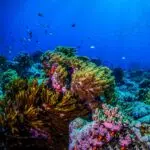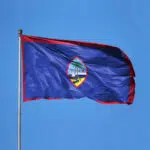Coral Reef Awareness Week is celebrated annually starting on Monday of the third full week in July and this year, it takes place from July 21 to 27. It’s to raise awareness of coral reefs and how to maintain them. Coral reefs are one of the most diverse and important elements of the earth’s ecosystem, but there are threats that coral reefs are facing, including climate change and tourism. Yes, tourism can affect coral reefs when there are poorly planned hotel developments and increased sewage. So, this week is for us all to learn more about coral reefs and how we can help maintain and protect these amazing and diverse ecosystems.
History of Coral Reef Awareness Week
Coral reefs are marine ecosystems built by tiny individual coral polyps held together by calcium carbonate. As diverse and complex ecosystems, coral reefs occupy less than 0.1% of the world’s ocean area. And at least 25% of all marine species call coral reefs home. Reef-building corals need sunlight to survive, so they are commonly found in relatively shallow, clear water in the tropics and warm currents. Besides those who call them home, coral reefs also attract larger animals such as sharks, turtles, and marine mammals due to their abundance of food.
Besides providing habitat for marine species, coral reefs also serve as a barrier for coastal areas. Shorelines will be less protected from waves and storms without coral reefs as a barrier. Coral reefs help protect people living in these areas, along with wildlife relying on the shoreline as a habitat. Also, coral reefs support the economy, including fishing, tourism, and recreation industries. Moreover, creatures found in these ecosystems are essential sources of new medicines. It seems that coral reefs are of the essence for both marine life and human life.
Unfortunately, there are some threats that coral reefs are facing. They include climate change, pollution, overfishing, tourism, and unsustainable coastal development. Corals cannot survive if the water temperature is too high, while urban and industrial waste, oil pollution, and agrochemicals can destroy coral reefs. Overfishing and destructive fishing practices surely cause significant damage to coral reefs. In the sector of tourism, there can be careless anchoring, fishing, and diving that can damage coral reefs. Besides, tourism leads to coastal development, and poor coastal development and increased sewage can affect coral reefs.
Coral Reef Awareness Week timeline
Coral reefs first appear, displacing the microbial and sponge reefs of the Cambrian.
Coral reefs start to decline by 50%, partly because of their sensitivity to water conditions.
There is widespread coral bleaching due to the El Niño event.
Around 14% of coral reefs decline globally due to their many threats.
Coral Reef Awareness Week FAQs
What will happen to coral reefs in 2050?
It is said that estimates predict nearly all of the reefs will be threatened, with 75% facing high, very high, or critical threat levels by 2050.
What is the biggest thing destroying coral reefs?
Increased ocean temperatures and changing ocean chemistry are the greatest global threats to coral reef ecosystems, caused by warmer atmospheric temperatures and increasing levels of carbon dioxide in seawater.
Will coral reefs go extinct?
Reportedly, scientists at 2020’s Ocean Sciences Meeting estimated that more than 90% of all coral reefs are expected to die by 2050.
How to Observe Coral Reef Awareness Week
Help clean the ocean
Diving to admire the beauty of coral reefs is one of the various ways to commemorate the week. This time, be careful to bring a dive bag and be sure to pick up any garbage you come across.
Eat sustainably
Coral Reef Awareness Week can be a starter for you to eat sustainably. So, next time you want to enjoy some seafood, make sure it comes from a sustainable source.
Spread the word
The more people know about this awareness week, the more help there will be to protect coral reefs. More people will also realize that coral reefs are essential for human beings.
5 Interesting Facts About Coral Reefs
They are animals, not plants
Coral reefs are not plants, but invertebrates within the class Anthozoa of the phylum Cnidaria.
They grow slowly
Generally, corals grow slowly, increasing only by 0.5 to 2 centimeters in a year.
The algae makes them colorful
The algae that the coral reefs host are what make the reefs colorful.
They clean the water
Coral reefs feed on particles found in the ocean, resulting in clear water.
They also live in cold water
Most coral reefs are found in tropical waters, but they are also found in waters with a temperature of 39.2 degrees Fahrenheit.
Why Coral Reef Awareness Week is Important
To raise awareness
Coral reefs are not only essential to marine life but also human life. That’s why more people need to know more about coral reefs so that we can help maintain them together.
They are amazing
Coral reefs are beautiful, and they are home to many species. Coral Reef Awareness Week reminds us of how amazing they are and that coral reefs are worth protecting.
Medications' sources
It is believed that coral reef-dwelling animals are a vital source of novel medications. Therefore, we must take all necessary precautions to keep them safe.
Coral Reef Awareness Week dates
| Year | Date | Day |
|---|---|---|
| 2024 | July 15–21 | Monday–Sunday |
| 2025 | July 21–27 | Monday–Sunday |
| 2026 | July 20–26 | Monday–Sunday |



















